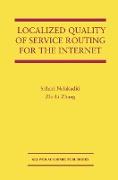- Start
- Localized Quality of Service Routing for the Internet
Localized Quality of Service Routing for the Internet
Angebote / Angebote:
The exponential growth of Internet brings to focus the need to control such large scale networks so that they appear as coherent, almost intelligent, organ isms. It is a challenge to regulate such a complex network of heterogeneous elements with dynamically changing traffic conditions. To make such a sys tem reliable and manageable, the decision making should be decentralized. It is desirable to find simple local rules and strategies that can produce coherent and purposeful global behavior. Furthermore, these control mechanisms must be adaptive to effectively respond to continually varying network conditions. Such adaptive, distributed, localized mechanisms would provide a scalable so lution for controlling large networks. The need for such schemes arises in a variety of settings. In this monograph, we focus on localized approach to quality of service routing. Routing in the current Internet focuses primarily on connectivity and typi cally supports only the "best-effort" datagram service. The routing protocols deployed such as OSPF use the shortest path only routing paradigm, where routing is optimized for a single metric such as hop count or administrative weight. While these protocols are well suited for traditional data applications such as ftp and telnet, they are not adequate for many emerging applications such as IP telephony, video on demand and teleconferencing, which require stringent delay and bandwidth guarantees. The "shortest paths" chosen for the "best effort" service may not have sufficient resources to provide the requisite service for these applications.
Folgt in ca. 5 Arbeitstagen




